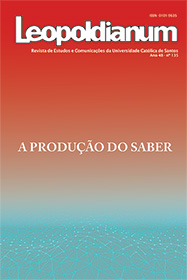LEMBRANÇAS PARENTAIS DE CUIDADORES FAMILIARES DE IDOSOS
DOI:
https://doi.org/10.58422/releo2022.e1318Abstract
Introduction: the increase of the elderly population presents new challenges for the confrontation of dementia syndromes. Elderly people with Major Neurocognitive Disorder (MND)
needs specific care normally performed by a relative. This study is part of a Master’s thesis
that sought to assess psychological conditions of caregivers of elderly people with dementia,
specifically memories of parental care and economic conditions. Objective: to analyze the
perception of the memories of family caregivers of the elderly with MND, about the parental
care received in childhood and adolescence and data on the economic class of these caregivers. Method: the sample consisted of 54 caregivers, attended: 1) in the Brazilian Association
of Alzheimer - Santos Subregional; 2) in the Service of Dementia Care, of UNIFESP, in
Santos; and 3) in the Reference Center for the Elderly in Cubatão - cities of Baixada Santista (São Paulo State). The evaluation instruments used were: 1) the Brazilian Economic Classification Criterion (CCEB); and 2) the Egna Minnen Betraffande Uppfostran Scale
(EMBU). The data were treated statistically in a descriptive way. Results: memories of parental care received by women indicated negative patterns of ‘rejection’ and ‘overprotection’
received from the mother. In men, there was a prevalence of positive bonding pattern of
‘emotional warmth’ received from the mother. Final considerations: the study suggests that
the caregivers analyzed were in a situation of social vulnerability, with losses with respect to
psychosocial interactions beyond the closest family context. Regarding parental bonds, the
study suggests that the mothers had the greatest influence on the participants of this sample
Published
Versions
- 2023-05-15 (2)
- 2022-08-19 (1)
Issue
Section
License
A Revista Eletrônica Leopoldianum - Revista de Estudos e Comunicações da Universidade Católica de Santos (ISSN: 2965-9566) é detentora dos direitos autorais de todos os artigos publicados por ela. A reprodução total dos textos em outras publicações, ou para qualquer outro fim, por quaisquer meios, requer autorização por escrito do editor. Reproduções parciais de artigos (resumo, abstract, mais de 500 palavras de texto, tabelas, figuras e outras ilustrações) deverão ter permissão por escrito do editor e dos autores.












